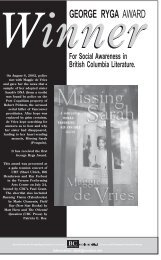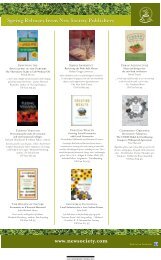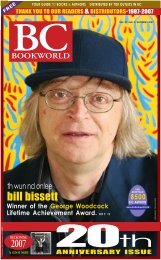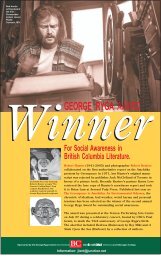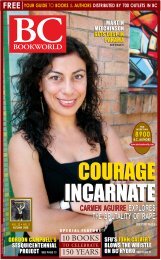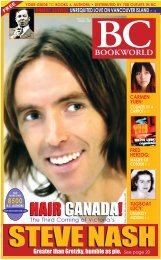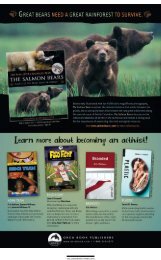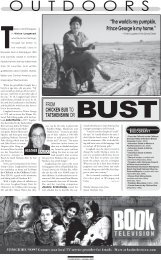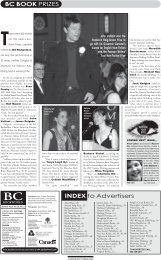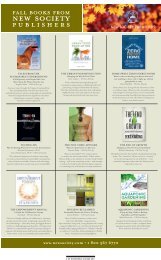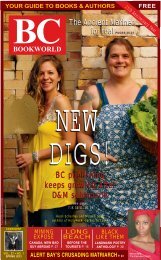BC letters - BC BookWorld
BC letters - BC BookWorld
BC letters - BC BookWorld
You also want an ePaper? Increase the reach of your titles
YUMPU automatically turns print PDFs into web optimized ePapers that Google loves.
eviews<br />
POETRY<br />
GREGOR’S GIFT<br />
This ain’t no Dead Poets Society--it’s a coherent choir<br />
A Verse Map of Vancouver edited by<br />
George McWhirter (Anvil $45)<br />
One can’t imagine<br />
Prince George or<br />
Kelowna or Surrey<br />
would have the hubris to generate<br />
a coffee table book of “verse<br />
geography” such as A Verse Map<br />
of Vancouver, edited by outgoing,<br />
pre-Olympic Poet Laureate<br />
George McWhirter.<br />
But Vancouver—and Victoria—take<br />
themselves seriously as<br />
city-states of the mind. The new<br />
Vancouver Mayor Gregor<br />
Robertson will be handing out<br />
gift copies of McWhirter’s quirky<br />
urban atlas to distinguished visitors—and<br />
good for him. Because<br />
McWhirter has molded a<br />
non-self-celebratory, mostly private<br />
reflection of a public place.<br />
On a Seabus ride, George<br />
Whipple describes “20-storey<br />
high steel pterodactyl cranes as<br />
delicate as dragonflies” and notices<br />
“one happy flag having an<br />
orgasm with the wind.”<br />
A Verse Map is not another advertisement<br />
for a ‘world class<br />
city’ to raise the property values<br />
even higher. It is a sampling of<br />
moments, of minor epiphanies<br />
amid the clamour of machines<br />
and the distractions of nature.<br />
✫<br />
Instructing contributors to<br />
accentuate places (rather than<br />
themselves) was a great idea, as<br />
was making the poems equal<br />
partners to Derek von Essen’s<br />
unpretentious urban photographs,<br />
but this patchwork of<br />
impressions is illuminating because<br />
McWhirter has mostly chosen<br />
poetry about how it feels to<br />
be a citizen of Vancouver.<br />
Shannon Stewart encounters<br />
electric eels and an octopus at<br />
the aquarium. Mark Cochrane<br />
describes the banjo busker outside<br />
the 4th & Alma liquor store.<br />
David Conn has a lovely description<br />
of returning home from<br />
work to non-descript East Vancouver,<br />
“body charged, euphoric,<br />
the daily commute an<br />
accomplishment.”<br />
Heidi Greco contributes a<br />
recollection of being stuck in an<br />
elevator of the Lee Building at<br />
Main and Broadway. George<br />
Stanley recalls the oddity of<br />
evacuating his building at 5:30<br />
a.m. due to a fire alarm, “apartment<br />
dwellers, strangers, gathered<br />
out on the sidewalk.”<br />
When the famously handsome<br />
English poet Rupert<br />
Brooke visited Vancouver and<br />
Victoria in 1913, he wrote, “You<br />
think B.C. means before Christ,<br />
but it doesn’t. I’m sitting, wildly<br />
surmising, on the edge of the<br />
Pacific, gazing at mountains<br />
which are changing colour every<br />
two minutes in the most surprising<br />
way. Nature here is half Japanese.”<br />
✫<br />
By opting not to provide context<br />
for the poems (i.e. by choosing<br />
not to inform the mayor’s<br />
next Distinguished Visitor that<br />
Joy Kogawa’s ode to her former<br />
home incorporates the painful<br />
family back story of forced internment<br />
during World War II),<br />
George McWhirter’s verse map<br />
is, well, half Japanese. Whatever<br />
Rupert Brooke meant by that.<br />
In 1921, the<br />
Canadian Pacific<br />
Railroad paid Coeur<br />
de Lion MacCarthy to<br />
make this Cordova<br />
Street statue depicting<br />
an angel carrying a<br />
World War I soldier<br />
to heaven.<br />
William New<br />
There is an element of<br />
haunting mystery to this carefully<br />
laid-out poetry garden of<br />
concrete and cherry blossoms.<br />
From VanDusen Gardens,<br />
Michael Bullock can see “The<br />
distant mountains / veil their<br />
sad faces / behind a scarf of<br />
mist.” You have to be a Vancou-<br />
my Vancouver starts<br />
by William New<br />
my Vancouver starts somewhere behind blackout curtains,<br />
starts in a fenced-garden<br />
with the canopy cloth on a wooden toy truck,<br />
camouflaged,<br />
starts with a streetcar ride<br />
and the dead soldier on cordova street,<br />
limp on an angel’s arm,<br />
dragged upward<br />
beside the southeast corner<br />
of the cpr station:<br />
the soldier never moved:<br />
ver insider to “get it.” But outsiders<br />
are welcome to have a<br />
gander, too.<br />
Bernice Lever describes the<br />
urban circus of Word on the<br />
Street with a knowingly jaundiced<br />
eye. Kate Braid describes<br />
the architecture of the Science<br />
Centre as an “ugly attempt to<br />
mimic heaven.” Jancis Andrews<br />
ponders a cultural divide when<br />
she peers at grandmothers in<br />
Chinatown who “seem boneless,<br />
these women, twigs of black<br />
pants and dragon-embroidered<br />
jacket.”<br />
Even Bud Osborn’s sublime<br />
poem about predators in the<br />
every childhood trip to town, there he stayed, hanging:<br />
heaven as close as maybe<br />
the north shore mountains,<br />
out of reach,<br />
the coastline dissolving in war and death,<br />
as clear as fear and rain<br />
—from A Verse Map of Vancouver, edited by George McWhirter<br />
(Anvil Press $45) 978-1-897535-02-8<br />
PHOTO BY DEREK VON ESSEN<br />
Downtown Eastside is more poetic<br />
than political. The shortest<br />
poem is Joseph Ferone’s haikulike<br />
four-liner about visiting the<br />
<strong>BC</strong> Collateral pawn shop. “The<br />
bus stopped / before the pawnshop<br />
window: / I went to the<br />
guitars, / you went to the<br />
knives.”<br />
Perhaps some poems about<br />
Vancouver from estranged outsiders—views<br />
of the Big Smoke<br />
from Anne Cameron in Tahsis—<br />
would have added a dash of piquancy<br />
but it’s silly to dwell on<br />
all the poets who might have<br />
been included. No Kerrisdale Elegies<br />
from Bowering. No Birney.<br />
No bissett, etc. Well, that just<br />
creates room for newcomers<br />
like Elizabeth Bachinsky,<br />
Stephanie Bolster and Daniela<br />
Bouneva Elza.<br />
Beyond the noteworthy inclusions<br />
of George Woodcock,<br />
Pat Lowther and Al Purdy, this<br />
ain’t no dead poets society.<br />
McWhirter’s Vancouver is mostly<br />
contemporary—and also fleeting.<br />
The editor’s selectivity has<br />
rendered this gathering of “surveyors”<br />
into a coherent choir of<br />
small voices. 978-1897535-02-8<br />
A Well-Mannered Storm: The Glenn Gould<br />
Poems by Kate Braid (Caitlin $16.95)<br />
It has been more than forty<br />
years since his last concert appearance,<br />
and more than twentysix<br />
since Glenn Gould died<br />
suddenly, but the pianist’s reputation<br />
as an eccentric and a musician<br />
remains as durable as The<br />
Beatles. Kate Braid’s A Well-Mannered<br />
Storm: The Glenn Gould<br />
Poems consists of an imagined<br />
correspondence between an<br />
unabashed fan named “K” and<br />
Gould, even though the notoriously<br />
fastidious Gould does not<br />
reply directly. Despite hearing<br />
problems, she finds her greatest<br />
comfort in his playing, particularly<br />
Bach. 1894759281<br />
Inventory by Marguerite Pigeon<br />
(Anvil, $15)<br />
Raised in Blind River, Ontario,<br />
Marguerite Pigeon of Vancouver<br />
received her MFA from<br />
the University of British Columbia<br />
in 2004. Her first book of poetry,<br />
Inventory, contains 58<br />
“object poems,” arranged alphabetically,<br />
describing the mundane<br />
to the mysterious. She has<br />
been influenced by Francis<br />
Ponge, Gertrude Stein, and<br />
Zbigniew Herbert. 978-1-895636-97-0<br />
ALSO RECEIVED<br />
Sumac’s Red Arms by<br />
Karen Shklanka, poems<br />
by a family physician (Coteau<br />
Books $16.95) 978-1-55050-402-6<br />
Little Hunger by Philip Kevin<br />
Paul, poems about nature, family<br />
and traditions (Nightwood<br />
Editions $16.95) 978-0-88971-220-1<br />
Poems for Blooming Natures<br />
by Ian Rudkin (Brio Book)<br />
978-0-9782963-4-6<br />
Swift Winds by Ron Sakolsky,<br />
includes poetry, rants, manifestos,<br />
and utopian visions.<br />
(Eberhard Press $10)<br />
33 <strong>BC</strong> BOOKWORLD SUMMER 2009



